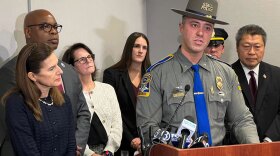The Emily Dickinson Museum in Amherst, Massachusetts, this week sold out tours the day it re-opened to the public for the first time in more than two years. Almost 100 visitors wandered through the home of the well-known but lesser understood 19th century poet. While not quite as large a crowd as Opening Day at Fenway Park, the museum said it was significant.
Like other cultural venues, the Dickinson homestead closed in March 2020 because of the pandemic, but Jane Wald, the museum’s executive director, said the shutdown allowed them to complete the second phase of ongoing building restoration, without disrupting visitors.
In 2019, the museum received a gift of $22 million from William McCall Vickery, a founding board member of the museum. The funds were specifically earmarked for the maintenance and improvement of the museum's buildings, grounds and collections.
In addition to the installation of a new heating and cooling system, textile historians matched carpets and wallpaper patterns, and an original stair banister and door found on the property were re-installed. Several rooms were also restored closer to their original décor, Wald said.
“There are no interior photographs of the homestead as far as we know, none exist from the time, so we had to rely both on forensic evidence and on descriptions that visitors to the homestead sent to other people in correspondence,” she said.
The carpet was described by attendees at Dickinson's mother's funeral.
“The story passed down by Emily Dickinson's niece is that there were two ladies who arrived at the funeral ahead of time, before the room was too crowded,” Wald said, “so they could see the magnificent parlor carpet which was described as ‘baskets of flowers in a pattern running to the edges of the room.’”
The word "home" in Dickinson’s poetry is a metaphor for many things, Wald added.
"She once said, ‘I do not cross my father's ground for any house or town,’ meaning that these three acres on which the homestead and the Evergreens [the home of Dickinson’s brother] sit, was kind of – to use a Dickinson word – her “circumscribed world,’” Wald said.
Dickinson was little known during her life but her 1,800 poems and letters have inspired readers worldwide, a notoriety helped in the last few years by several Hollywood movies and in 2019, a more fantastical interpretation of her life, "Dickinson" on Apple TV+.
Show producer Alena Smith donated several historic items from the set to the museum, and Wald said they’re now part of bringing visitors as close as possible to the place where the poet lived and wrote until her death in 1886.
The television series is what brought Bob and Patty Normand to the homestead. The Normands, who live in Holyoke, and grew up in the area said they always knew about Dickinson but had "kind of forgotten about her," until watching the television series, starring Hailee Steinfeld.
“And then, we just couldn’t wait for the house to open so we could come again and revisit the whole experience of Emily,” Patty Normand said.
In the show, Death is played by the rapper Wiz Khalifa. In a carriage ride with Dickinson, he promises her immortality and “foretells the carnage of the Civil War. Spoken by a Black actor, the warning carries a retributive chill,” Katy Waldman wrote in the New Yorker.
Episodes connected with Dickinson’s writing, and some were explicit in what may or may not have been erotic prose; the show writers took scholarly research about Dickinson’s relationship with friend and -sister-in-law Sue to another level.
“The show – we thought it was just going to be a period piece which would have been fine,” said Bob Normand, “and it sort of starts out that way, and then all of a sudden, it's like somebody scratching the needle on a record!”
“We’re older,” he said, “but for younger people who may not know Emily Dickinson, or maybe think she's old-fashioned, the series relates to a younger demographic. It seems like a really great way to bring a whole new generation of people into Dickinson’s world.”
Many historic museums and symphony orchestras have for years been trying to lure in a younger, more diverse demographic, and what’s on the program or being shown is critical to that effort, cultural organization administrators say.
At the Dickinson homestead, museum officials said, special events and the script for the house tour itself have been revamped to reflect a connection with the last two years of enormous social change in the U.S., focusing on race, class issues and labor.
One matter that came up for the Normands on their tour was the lack of emphasis on the anti-slavery movement in Dickinson’s letters, given her correspondence with Thomas Wentworth Higginson, an abolitionist, a published writer — and after her death, an editor of Dickinson’s poems.
“When you talk about a mid 19th century person, what their views on race or social class was, it kind of jars us, you know, now because of Black Lives Matter and [the Me Too] movement,” Bob Normand said.
Before retiring, the Normands ran a popular bakery for 30 years in nearby Northampton. Their only disappointment in the tour was that the Dickinson kitchen, featured frequently in the Apple TV+ show, wasn’t included.
That space, along with the domestic wing where the Dickinson servants lived, is part of a final restoration phase at the museum. It's expected to take place, likely with the museum open, in the next five years.
















